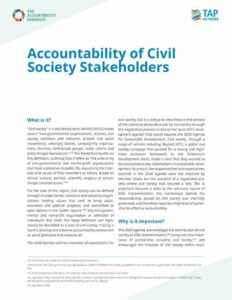Accountability of Civil Society Stakeholders
What is it?
“Civil society” is a very broad term, which CIVICUS states covers “non-governmental organisations, activists, civil society coalitions and networks, protest and social movements, voluntary bodies, campaigning organisations, charities, faith-based groups, trade unions and philanthropic foundations.”1 The World Bank builds on this definition, outlining that it refers to “the wide array of non-governmental and not-for-profit organizations that have a presence in public life, expressing the interests and values of their members or others, based on ethical, cultural, political, scientific, religious or philanthropic considerations.”2
For the sake of this report, civil society can be defined through multiple lenses: collective and voluntary organizations; holding values that seek to bring social, economic and political progress; and committed to open debate in the “public square.”3 Any non-governmental and non-profit organization or collection of individuals that meet this loose definition can legitimately be described as a part of civil society, making it hard to develop one cohesive accountability mechanism or set of principles that relate to all.
The 2030 Agenda outlines a number of expectations for civil society, but it is critical to view these in the context of the collective demands made by civil society through the negotiation process to devise the “post-2015 development agenda” that would become the 2030 Agenda for Sustainable Development. Civil society, through a range of vehicles including Beyond 2015, a global civil society campaign that pushed for a strong and legitimate successor framework to the Millennium Development Goals, made it clear that they wanted to be considered as key stakeholders in sustainable development. As a result, the responsibilities and expectations outlined in the 2030 Agenda were not imposed by Member States but the outcome of a negotiated process where civil society had secured a role. This is important because it adds to the voluntary nature of SDG implementation: the momentum behind the responsibilities placed on civil society was internally generated, and therefore requires a high level of ownership for effective accountability.
Why is it important?
The 2030 Agenda acknowledges the contribution of civil society to SDG implementation,4 recognizes the importance of partnership including civil society,5 and encourages the inclusion of civil society within country-level preparations for a government’s Voluntary National Review.6 Paragraph 89 of the 2030 Agenda states that “The HLPF will support participation in follow-up and review processes by the major groups and other relevant stakeholders in line with Resolution 67/290. We call on these actors to report on their contribution to the implementation of the Agenda.”7 In a recent technical paper published by UN DESA, this has been described as “deceptively complicated” and necessitating a sensitive architecture that recognizes the diverse nature of civil society, the breadth of the 2030 Agenda and the different ways in which civil society contribute.8
Civil society clearly have a responsibility to develop mechanisms by which they will be held accountable, but it is rarely clear to whom they should be accountable and for what. They need to be held accountable by government on a regulatory footing (ensuring financial conduct and adherence to the legislative framework), but challenging government systems is a critical role for civil society. It may not be simple to unpack this distinction, especially in contexts where civic space is shrinking, and governments are putting in place restrictive legislation for civil society. In addition, civil society may be comprised of or represent a specific section of society, and this will require accountability to members and stakeholders. For larger international NGOs, which make up a relatively small proportion of civil society but a significant proportion of funding, there are additional complications in accountability to beneficiary communities, donors and peer groups.
As a result, the most important aspect of civil society accountability is clarity from each civil society group about what its individual contribution is. Outlining these, in the context of the 2030 Agenda, should focus on the following key responsibilities:
• Promote the voice and participation of people in decisions that affect their lives, especially in ensuring that the 2030 Agenda reaches the “furthest behind first;”9
• Hold governments accountable for their responsibility to implement the 2030 Agenda in a way that respects the three dimensions of sustainable development (economic, environmental and social) in an indivisible manner that leaves no one behind;10
• Reflect and respect a diverse range of perspectives, in line with a commitment to a civic space;11
• Ensure transparency in operations and strategy, and a commitment to openness on successes and failures (SDG target 16.6); and
• Commit to working in fair and respectful partnerships in the implementation and accountability of the 2030 Agenda (SDG target 17.17).
How can it be used?
There are a number of potential mechanisms for accountability that can be used by CSOs, but they should include a commitment to:
• Mapping contributions, in terms of compliance to the 2030 Agenda and key principles and impact of work on SDG implementation – this should include a process of strategic alignment, to ensure that there is clarity over the CSO’s contribution and how it will be reported;
• Being clear to whom reporting is appropriate and about what – this should include sharing information on the 2030 Agenda and the CSOs’ specific contribution to key stakeholders and their role in holding the CSO you accountable;
• Reporting on the specific benefit of including civil society within SDG planning and accountability cycles – it is important to communicate the role that the CSO can play in achieving the 2030 Agenda and the groups or issues that will lack representation without its participation. This is in addition to the more general principle of participation and inclusion.

